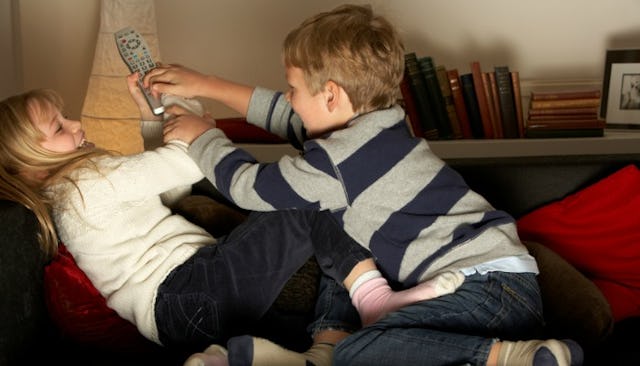I Refuse To Referee My Kids' Friendship Drama

As a mother, I am many things: a carpool chauffeur, a boo-boo kisser, a bedtime enforcer. But one thing I try to be as little as possible is friendship referee. In fact, attempts to get me to play judge and jury to my kids’ everyday conflicts, fights, and quarrels usually go something like this:
“Mo-om! So-and-so did such-and-such!”
“I don’t want to hear it.”
“But Mom —”
“Nope. I’m not getting involved.”
“But Mom!”
“Work it out on your own.”
“But Mom, he —”
“Listen, buddy, if you insist on involving me in your disagreement, you might not like the way I resolve it.”
My son will pause, sigh, and walk away. Within a few minutes whatever battle was on the verge of beginning World War III will have been resolved without my involvement.
Admittedly, part of my refusal to play judge and jury for my kids’ squabbles is born of my own laziness and self-preservation. I hate confrontation, especially when it involves people I love. Not to mention that time spent socializing with family friends is significantly less enjoyable when my grown-up conversations are interrupted by whiny complaints or tattling children. And getting involving in their squabbles will undoubtedly result in negative feelings toward my kid, the other kid, or both kids. I do not need to know about every transgression, especially the ones that are minor and will be resolved through natural consequences.
But the real reasons I take the DIY approach to conflict resolution and let my kids fend for themselves are bigger and less selfish. I believe that conflict resolution is one of the most important life skills a person can learn. If you are a living, breathing, feeling person interacting with other living, breathing, feeling humans, there will undoubtedly be conflicts from time to time. There will be fights and hurt feelings. There will be disagreements and misunderstandings. There will be differences of opinion and battles of the mind. The sooner my kids figure out how to navigate those potential minefields of human emotion, the better.
I want my children to learn how to listen, apologize, and forgive. I want them to figure out how to compromise and share. I want them to practice letting shit go, so they can firmly stand their ground when it comes to the stuff that matters. And the only way you learn these skills is through practice and feeling your way through the mucky conflicts on your own.
I also want my kids to feel comfortable coming to me when the shit really hits the fan and they really need help. To do so, we need to build a relationship of trust, knowing that when they come to me for help, it’s because they really need my help with serious shit. If I hear every petty complaint about who did what to whom — complaints that are no doubt exaggerated because kids are little drama stars — then I will have to guess whether something is serious shit or trifling shit. Instead, by enabling my kids to solve their own problems, especially when it’s trifling shit, they will feel comfortable coming to me when they are dealing with some serious shit. And they’ll have the confidence that together we will figure it out and kick some ass.
Is stepping aside and not getting caught up in their drama difficult? Of course. There is a natural tendency for parents to want to solve their children’s problems, to pave the way, to clear the path of anything that might cause them pain or discomfort — and that includes conflicts and squabbles with their friends and with each other. But as hard as it might be sometimes, I force myself to stay out of it and let them settle their own disagreements knowing that, in the end, they will be better for it.
As parents, we have many roles and responsibilities, not the least of which is empowering our dependent children to become independent adults. In giving them space to work shit out on their own, we are teaching our kids how to be kind people and good friends with healthy relationships.
So for their sake, I butt out and let them settle their squabbles and disagreements, even though it means they might get a little messy in the process.